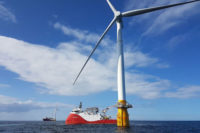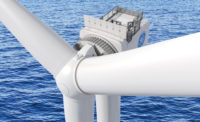In a novel procurement link in the U.S. for offshore wind energy production, Massachusetts, Rhode Island and Connecticut have agreed to an approach they say would better coordinate the selection of developer proposals and enable potential cross-border sharing of port, manufacturing and other supply chain investments. The aim is to curtail a recent spate of project cost increases and some cancellations.
The states’ memorandum of understanding was announced Oct. 4 by Massachusetts Gov. Maura Healey at an American Clean Power Association offshore wind production conference in Boston. Under the MOU, the states will jointly seek multistate offshore wind proposals, under which developers could submit bids to one or two states, instead of to all three.
The move is welcomed by the wind-energy sector. "This sort of collaboration is exactly what’s needed to drive a steady supply chain and economies of scale," said one power contractor executive.
Combined, the states’ solicitations are for up to 6,000 MW of offshore wind power production. Massachusetts now seeks bids for up to 3,600 MW, about 25% of its power needs, with bids due in January. Connecticut and Rhode Island each seek 1,200 MW in similar procurement rounds set for next year.
The other states in New England’s six-state power market also would benefit from onshore investments made in neighboring states, officials said. Massachusetts plans to sign contracts for 5,600 MW of offshore wind by 2027 under its plan to reach net-zero emissions by 2050. Connecticut aims for 2,000 MW of offshore wind to achieve carbon-free power by 2040, and Rhode Island seeks 1,000 MW of offshore wind to reach carbon-free power by 2033.
The collaboration will allow the three states to leverage their collective buying power to encourage larger wind farms that could potentially be built at lower costs than if they were bid separately for each, the agreement document says.
“Building out offshore wind to the scale that we need requires this intense regional collaboration and approach,” said Healey. “The climate crisis requires us to act in new and innovative ways." She told conference attendees that "whatever turbulence this industry may be experiencing, we remain all in as your partner.”
Developers say inflation and other sources of cost pressure—including supply chain shortfalls—have had major impact on project power purchase agreements signed up to four or more years ago.
Two projects in Massachusetts have been approved to cancel their utility contracts: the 1,200-MW Commonwealth Wind project and the similarly sized SouthCoast Wind project. They paid a total of more than $100 million to utilities to cancel but are set to submit new bids in the current state wind procurement round, but at expected higher prices.
Rhode Island cancelled plans this summer for a second stage 1,000-MW Revolution Wind project, just one month after the first one received federal approval—and and earlier this week, Avangrid said it had terminated a power contract with Connecticut for the 804-MW Park City Wind, agreeing to a $16 million penalty.
According to the state agreement, bids that emphasize regional collaboration will be given preference. Actual project selections will depend on states’ individual assessments of proposals’ costs and benefits to ratepayers and other evaluation criteria specified in their respective requests for proposals. Any two or three states may agree to select one or more multistate proposal up to the procurement authority of each and can split expected megawatts of power and renewable energy certificates from a single project.
“This is a real testament that we can find new solutions,” Massachusetts Dept. of Energy Resources Commissioner Elizabeth Mahoney said.
In a statement, Avangrid CEO Pedro Azagra termed the states' approach a "bold procurement strategy" that offers offshore wind developers "an opportunity to leverage economies of scale that will unlock more competitive bids and the potential for greater investments in local development and job creation."






Post a comment to this article
Report Abusive Comment